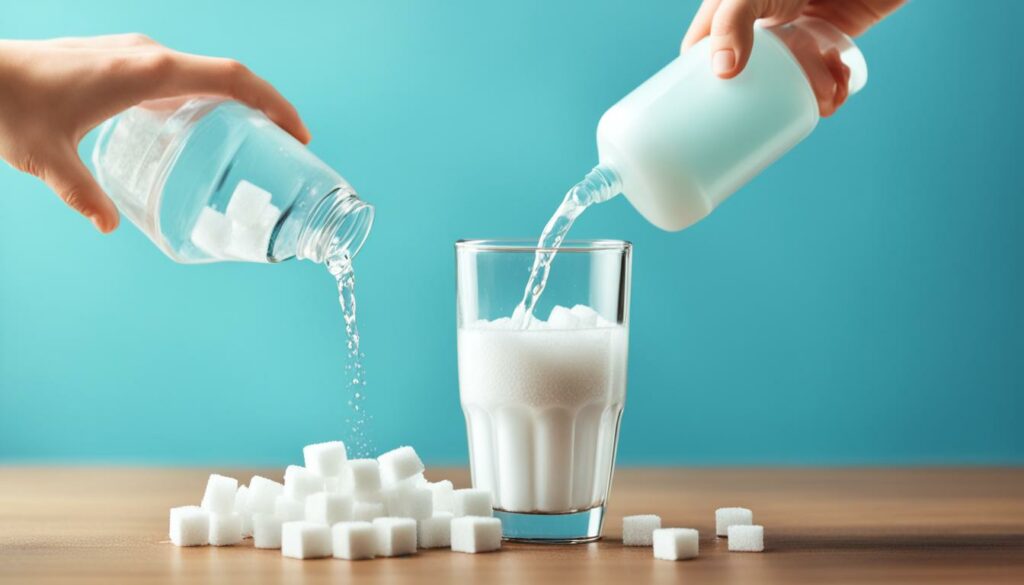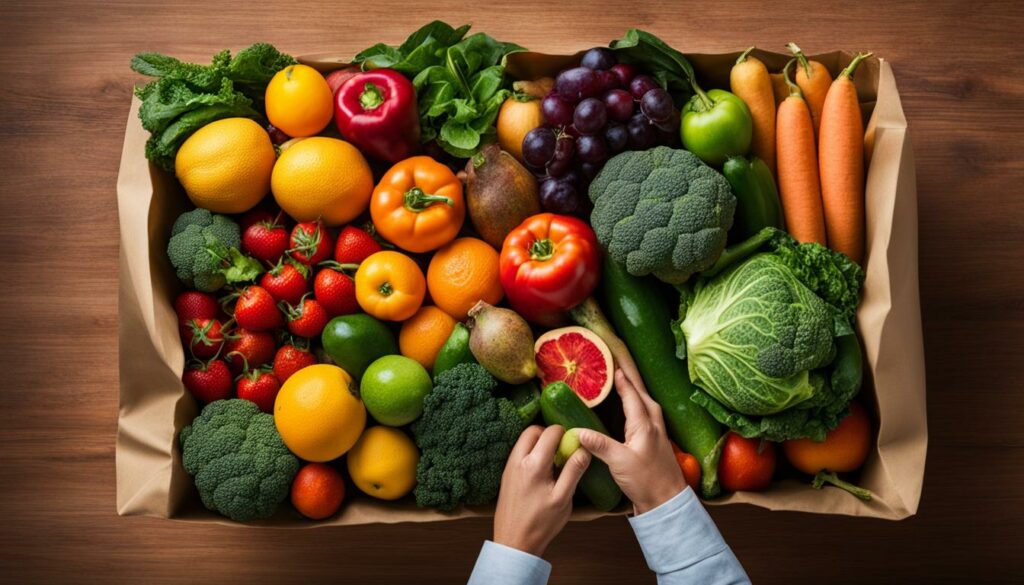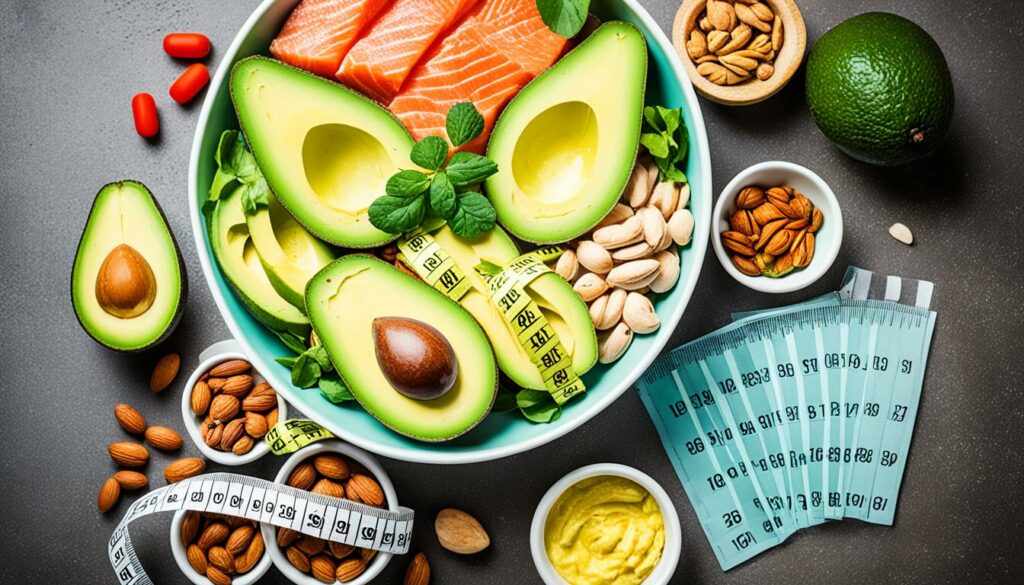Teen Belly Fat Loss Tips – Safe & Effective-Methods
Are you a teenager looking for ways to lose stomach fat? You’re not alone! Many teens struggle with excess weight and are eager to adopt a healthier lifestyle. The good news is that there are safe and effective methods to help you achieve your weight loss goals. In this article, we will provide you with valuable information and tips on how to lose stomach fat for teens.
Key Takeaways:
- Setting healthy, realistic goals is crucial for teenage weight loss
- Cut back on sweetened beverages to reduce excess weight
- Add physical activity to your daily routine to burn calories and improve overall fitness
- Choose nourishing, nutrient-dense foods to fuel your body
- Don’t avoid fats completely, but focus on healthy sources
Set Healthy, Realistic Goals
When it comes to achieving weight loss and body-image goals, setting healthy and realistic expectations is crucial for teenagers. While it’s natural to desire a fit and toned physique, focusing solely on body weight can be misleading and disheartening. Instead, teens should prioritize overall health and well-being by adopting a balanced approach that combines improving their diet and increasing physical activity.
Establishing realistic weight and body-image goals helps teens maintain a positive mindset and stay motivated throughout their journey. It’s important to remember that healthy weight loss is gradual and sustainable rather than a quick fix. By making gradual, long-term changes to their lifestyle, teens can achieve lasting results and establish healthy habits that will benefit them well into adulthood.
Improving the diet is a key component of successful weight loss for teens. Instead of focusing on restrictive diets, teens should aim to make sustainable changes that prioritize nutrient-dense foods. By incorporating a variety of fruits, vegetables, whole grains, lean proteins, and healthy fats into their daily meals, teens can nourish their bodies while still achieving their weight loss goals.
In addition to diet, increasing physical activity is crucial for effective weight loss. Encouraging teens to engage in regular exercise and find activities they enjoy makes it more likely that they will stay committed to their fitness routine. Whether it’s participating in team sports, dancing, hiking, or cycling, finding enjoyable physical activities helps teens stay active and motivated on their weight loss journey.
Having realistic weight and body-image goals is important for teens. The focus should be on improving health and not just body weight. Teens should aim to improve their diet and increase physical activity for effective weight loss.
To help tease out the importance of setting realistic goals and focusing on overall health, consider the following table:
| Unrealistic Goal | Realistic Goal |
|---|---|
| Goal: Lose 20 pounds in a week | Goal: Aim for gradual weight loss of 1-2 pounds per week |
| Approach: Extreme calorie restriction and excessive exercise | Approach: Adopt a balanced diet and engage in regular physical activity |
| Outcome: Nutrient deficiencies, loss of muscle mass, and potential health risks | Outcome: Improved overall health, sustained weight loss, and increased energy levels |
Cut Back on Sweetened Beverages

When it comes to achieving weight loss goals, one simple yet effective strategy for teens is to cut back on sweetened beverages. Beverages like sodas, energy drinks, and fruit drinks are often loaded with added sugars, which can contribute to weight gain and various health problems. By reducing consumption of these sugary drinks, teens can make significant strides towards shedding excess weight and improving their overall well-being.
A high intake of added sugars has been linked to obesity, type 2 diabetes, heart disease, and other chronic health conditions. In fact, studies have shown that drinking just one or two sugary beverages per day can significantly increase the risk of developing these health issues. By eliminating or minimizing the consumption of sweetened beverages, teens can reduce their overall added sugar intake and take a step towards better health.
Instead of reaching for a sugary soda or energy drink, teens should opt for healthier alternatives such as water, unsweetened tea, or flavored water without added sugars. These options not only quench thirst but also hydrate the body without the excess calories and sugars found in sweetened beverages.
Remember, cutting back on sweetened beverages is a simple and effective way for teens to reduce their added sugar consumption, promote healthy weight loss, and improve overall well-being.
Benefits of Cutting Back on Sweetened Beverages
“By reducing sweetened beverage consumption, teens can lower their intake of added sugars, which is essential for weight management and overall health.”
| Benefits of Cutting Back on Sweetened Beverages | Effects on Teen Weight Loss Journey |
|---|---|
| Reduces excess calorie intake | Helps create a calorie deficit for weight loss |
| Lowers added sugar consumption | Reduces the risk of weight gain and health problems |
| Promotes hydration with healthier alternatives | Aids digestion and supports overall well-being |
| Improves dietary choices | Encourages the intake of nutrient-dense foods |
By cutting back on sweetened beverages, teens not only decrease their intake of added sugars but also take significant steps towards achieving their weight loss goals. Additionally, reducing or eliminating sugary drinks from their diet encourages healthier beverage choices and supports overall hydration and well-being.
Add in Physical Activity
Physical activity plays a crucial role in helping teens lose stomach fat and achieve their weight loss goals. By increasing overall daily activity levels, teens can effectively burn calories, improve fitness, and enhance their overall well-being. The key to sustaining an active lifestyle is finding enjoyable activities that make exercise fun and engaging.
Instead of thinking of physical activity as a chore, teens can explore a variety of activities that align with their interests and preferences. Whether it’s playing sports, hiking in nature, dancing, or joining a fitness class, the options are endless. By finding enjoyable activities, teens are more likely to stay motivated and consistent in their exercise routine.
“Exercise should be viewed as an opportunity to discover activities you love rather than a burden.”
Engaging in a variety of physical activities not only helps with weight loss but also improves cardiovascular health, increases muscle strength, and boosts mental well-being. Regular exercise releases endorphins, which can uplift mood and reduce stress and anxiety.
To inspire teens to incorporate physical activity into their daily lives, here are some enjoyable options:
- Joining community sports teams or clubs
- Participating in dance or martial arts classes
- Exploring outdoor activities like hiking, biking, or skating
- Trying out new workout routines or fitness apps
By incorporating these activities into their routine, teens can make exercise a habit and enjoy the process of working towards their weight loss goals.
Benefits of Regular Physical Activity for Teens
| Benefits | Description |
|---|---|
| Weight loss and fat burning | Regular physical activity helps in burning calories and reducing stomach fat. |
| Improved cardiovascular health | Exercise strengthens the heart and improves blood circulation, reducing the risk of cardiovascular diseases. |
| Enhanced muscle strength | Regular exercise helps build and tone muscles, improving overall strength and physical performance. |
| Improved mental well-being | Physical activity releases endorphins, which uplift mood, reduce stress, and improve overall mental well-being. |
| Increased energy levels | Regular exercise boosts energy levels and reduces fatigue, allowing teens to stay active throughout the day. |
Fuel Your Body With Nourishing Foods

When it comes to losing weight and maintaining a healthy body, it’s important for teens to fuel their bodies with nutrient-dense foods. Instead of solely focusing on calorie content, choosing the right combination of vegetables, fruits, whole grains, healthy fats, and proteins is key.
Vegetables play a crucial role in a teen’s diet as they are packed with essential vitamins, minerals, and fiber. Including a variety of colorful vegetables, such as leafy greens, broccoli, carrots, and bell peppers, not only provides necessary nutrients but also helps in weight loss by keeping teens feeling full and satisfied.
Fruits are another important component of a balanced diet for teens. They offer natural sweetness, a range of vitamins, and dietary fiber. Encouraging teens to choose fresh, whole fruits like berries, apples, and oranges over processed fruit snacks or sugary desserts supports their weight loss goals and provides long-lasting energy.
Whole grains, such as brown rice, quinoa, whole wheat bread, and oats, are excellent sources of complex carbohydrates and fiber. These not only contribute to a feeling of fullness but also provide sustained energy throughout the day, making them essential for managing weight and supporting overall well-being.
Healthy fats, like those found in avocados, nuts, seeds, and olive oil, are also necessary for a well-rounded diet. Contrary to popular belief, consuming healthy fats in moderation can actually aid in weight loss. These fats provide satiety, flavor, and important nutrients, making them a valuable addition to a teen’s meal plan.
Lastly, incorporating lean proteins into meals is vital for weight loss and muscle development. Foods such as skinless chicken breast, turkey, tofu, beans, and fish are excellent sources of protein that can help teens feel fuller for longer and support healthy body composition.
By choosing nutrient-dense foods like vegetables, fruits, whole grains, healthy fats, and proteins, teens can nourish their bodies and achieve sustainable weight loss. The next section will focus on the importance of not avoiding fats and making healthy swaps for unhealthy fat sources.
| Foods to Include for Weight Loss | Foods to Avoid |
|---|---|
| Vegetables: Spinach, broccoli, carrots, bell peppers | Sugar-laden snacks: Candy, cookies, sugary cereals |
| Fruits: Berries, apples, oranges | Sweetened beverages: Sodas, energy drinks, fruit drinks |
| Whole Grains: Brown rice, quinoa, whole wheat bread, oats | Processed foods: Chips, fast food, processed snacks |
| Healthy Fats: Avocados, nuts, seeds, olive oil | Fried foods: French fries, fried chicken |
| Lean Proteins: Skinless chicken breast, turkey, tofu, beans, fish | Highly processed meats: Hot dogs, sausages |
Don’t Avoid Fat

Teens shouldn’t avoid fat completely. In fact, incorporating healthy fats into their diet is crucial for proper growth and development. Healthy fats provide essential nutrients and energy that support various bodily functions. Instead of eliminating fats, it’s important for teens to focus on swapping unhealthy fat sources with healthier alternatives.
Unhealthy fats, such as the ones found in deep-fried foods and processed snacks, can contribute to weight gain and have negative effects on overall health. By swapping these unhealthy fat sources with nutritious options, teens can promote healthy weight loss and improve their well-being.
The Importance of Healthy Fats
Healthy fats are beneficial for teens in several ways:
- They provide a concentrated source of energy, essential for the growth and development of teenagers.
- They aid in the absorption of fat-soluble vitamins, such as vitamins A, D, E, and K.
- They support brain function and cognitive development.
- They help regulate hormones and promote healthy skin.
- They contribute to a feeling of satiety, preventing overeating and cravings.
Some examples of healthy fats that teens can include in their diet are:
- Nuts and seeds: Almonds, walnuts, chia seeds, and flaxseeds are excellent sources of healthy fats.
- Avocados: Avocados are rich in monounsaturated fats, which are heart-healthy fats.
- Fatty fish: Salmon, mackerel, and sardines are high in omega-3 fatty acids, which have numerous health benefits.
- Olive oil: Extra virgin olive oil is a healthy source of monounsaturated fats and can be used for cooking or as a salad dressing.
“Healthy fats are essential for teens’ growth, development, and overall well-being. Swapping out unhealthy fat sources with healthier options can help promote weight loss and support a healthy lifestyle.”
– Registered Dietitian, Jane Smith
Limit Added Sugars

It’s important for teens to be aware of the impact of added sugars on their appetite and overall health. Consuming high-sugar foods like candies, cookies, and sugary cereals can have negative effects on their well-being. These foods are often low in essential nutrients and can lead to overeating, contributing to weight gain.
To promote a healthy lifestyle, teens should strive to avoid high-sugar foods as much as possible. Instead, they should opt for nutrient-rich alternatives that provide sustained energy and support proper growth and development.
Research shows that high-sugar consumption can have a detrimental effect on academic performance, sleep quality, and mood in teens. By limiting their intake of added sugars, teens can improve their overall well-being and maintain a balanced appetite.
“Avoiding high-sugar foods is crucial for regulating appetite and preventing excessive calorie consumption in teens. By making mindful choices and opting for healthier alternatives, they can prioritize their health and maintain a healthy weight.”
To better understand the impact of added sugars on appetite and health, let’s take a closer look at some key points:
The Link Between High-Sugar Foods and Overeating
High-sugar foods are often low in fiber and protein, two important nutrients that promote feelings of fullness and satiety. As a result, consuming these foods can lead to increased hunger levels and a higher likelihood of overeating.
Moreover, sugary snacks and beverages tend to be calorie-dense but nutrient-poor. This means that they provide a significant amount of calories without delivering the essential vitamins, minerals, and other beneficial compounds that the body needs.
The Negative Effects of Added Sugars on Health
Excessive consumption of added sugars has been linked to various health issues, including obesity, type 2 diabetes, and cardiovascular disease. These health problems can have long-term implications for teens, affecting their overall well-being and increasing the risk of chronic diseases later in life.
By limiting their intake of high-sugar foods, teens can reduce their risk of developing these health conditions and ensure a healthier future.
To visualize the impact of added sugars on appetite and health, take a look at the table below:
| High-Sugar Foods | Consequences |
|---|---|
| Candies | Elevated blood sugar levels, increased cravings |
| Cookies | Potential weight gain, decreased nutrient intake |
| Sugary Cereals | Risk of obesity, poor appetite regulation |
It’s clear that reducing the consumption of high-sugar foods is the key to maintaining a healthy appetite and promoting overall well-being. Teens should aim to make informed food choices, opting for low-sugar alternatives that provide essential nutrients and support a balanced lifestyle.
Avoid Fad Diets
Teens should steer clear of fad diets that promise quick weight loss. These diets often involve drastic restrictions, elimination of entire food groups, or the use of supplements or products that can be harmful to their health. Instead, it’s important for teens to focus on slow and healthy weight loss through sustainable lifestyle changes.
Why Avoid Fad Diets?
- Fad diets are usually ineffective in the long term. While they may lead to initial weight loss, the weight is often regained once the diet is stopped.
- Fad diets can be harmful to health, especially for growing teens who need a balanced and nutritious diet for proper growth and development.
- Many fad diets are highly restrictive and can result in nutrient deficiencies, which can have long-term negative effects on overall health.
- Fad diets can lead to an unhealthy relationship with food, causing feelings of guilt, deprivation, and obsession.
“Fad diets are like a mirage in the desert. They promise quick results, but ultimately leave you feeling unsatisfied and thirsty for sustainable solutions.”
Focus on Slow and Healthy Weight Loss
Teens should prioritize slow and healthy weight loss strategies that promote long-term success. This involves making realistic changes to their eating habits and incorporating regular physical activity into their daily routine. By adopting a balanced and sustainable approach to weight loss, teens can achieve their goals while also improving their overall health and well-being.
The Fallacy of Fad Diets
Fad diets often seem appealing due to their promises of quick results. However, they fail to address the root causes of weight gain and don’t teach teens the necessary skills for maintaining a healthy weight. Instead, these diets offer temporary solutions that can have long-term negative consequences on both physical and mental health.
Table: Comparing Fad Diets vs. Healthy weight loss strategies
| Fad Diets | Healthy Weight Loss Strategies |
|---|---|
| Promote quick weight loss | Emphasize slow and steady progress |
| Restrictive and unsustainable | Promote balanced and sustainable lifestyle changes |
| Often lead to weight regain | Promote long-term weight maintenance |
| Can result in nutrient deficiencies | Ensure proper nutrient intake for optimal growth |
Eat Your Veggies
When it comes to reaching and maintaining a healthy body weight, including vegetables in meals can make a significant difference. Not only are vegetables low in calories, but they are also packed with essential nutrients that support overall health.
One of the key benefits of vegetables for weight loss is their high fiber content. Fiber helps to keep you full for longer periods, reducing the likelihood of overeating or snacking on unhealthy foods. By incorporating fiber-rich vegetables into your diet, you can curb cravings and maintain a healthy caloric intake.
Additionally, vegetables have a high water content, contributing to their weight loss benefits. The water content in vegetables helps to hydrate the body and maintain a feeling of fullness, preventing excessive eating. By choosing vegetables that have a high water content, such as cucumbers, celery, and lettuce, you can promote healthy weight loss.
“Vegetables are not only nutritious but also a great way to add volume and variety to your meals.” – Dr. Anna Smith, Registered Dietitian
Incorporating a variety of vegetables into your meals is essential for obtaining a wide range of nutrients. Aim to include a colorful assortment of vegetables like leafy greens, tomatoes, peppers, broccoli, and carrots in your diet. By doing so, you can enjoy the benefits of vegetables for weight loss while nourishing your body with essential vitamins, minerals, and antioxidants.
The Role of Vegetables in a Teen’s Diet
For teens looking to lose weight, vegetables can play a crucial role in their journey. Adolescence is a critical period of growth and development, and vegetables provide the necessary nutrients to support this process.
Moreover, incorporating vegetables into meals can help teens establish healthy eating patterns that they can carry into adulthood. By emphasizing the importance of vegetables, parents and caregivers can instill lifelong habits that promote weight management and overall wellness.
Ways to Include More Vegetables in Your Diet
Here are a few simple tips to help you increase your vegetable intake:
- Add vegetables to your favorite dishes, such as stir-fries, omelets, or pasta sauces.
- Snack on raw vegetables with hummus or a healthy dip.
- Experiment with different cooking methods to enhance the flavor of vegetables, such as roasting or grilling.
- Try new and exotic vegetables to expand your palate and add variety to your meals.
Remember, the key is to make vegetables a regular part of your daily meals and snacks. By doing so, you can reap the numerous benefits they offer for weight loss and overall health.
| Vegetable | Fiber Content (per 100g) | Water Content (per 100g) |
|---|---|---|
| Broccoli | 2.6g | 89.3g |
| Spinach | 2.2g | 91.4g |
| Carrots | 2.8g | 88.3g |
| Cucumbers | 0.5g | 95.2g |
Don’t Skip Meals
Skipping meals, especially breakfast, can have negative effects on both physical and mental well-being. It may seem like a shortcut to weight loss, but in reality, it can lead to overeating later in the day and hinder progress. It is important for teens to understand the importance of eating balanced meals throughout the day to fuel their bodies and support overall health.
Breakfast is often referred to as the most important meal of the day, and for good reason. When you skip breakfast, your body misses out on essential nutrients and energy to start the day. This can leave you feeling tired, sluggish, and more likely to reach for unhealthy snacks later on.
To avoid the negative effects of skipping breakfast, teens should prioritize eating a balanced meal in the morning. This means including a variety of food groups such as whole grains, lean proteins, fruits, and dairy or dairy alternatives.
A higher protein breakfast is especially beneficial as it can help keep you fuller for longer, reduce cravings, and prevent excessive snacking throughout the day. Including foods like eggs, Greek yogurt, or a protein smoothie can provide the necessary protein to kickstart your day.
“Breakfast is the most important meal of the day. It provides your body and brain with the necessary fuel and nutrients to start your day off right.”
By consistently eating balanced meals, teens can maintain stable blood sugar levels, keep their metabolism functioning optimally, and avoid the pitfalls of skipping meals. Additionally, balanced meals can provide the necessary nutrients for growth and development, support cognitive function, and help maintain a healthy weight.
To illustrate the importance of eating balanced meals, the table below showcases the negative effects of skipping breakfast and the benefits of fueling your body with a nutritious morning meal:
| Negative Effects of Skipping Breakfast | Benefits of Eating a Balanced Breakfast |
|---|---|
| Increased hunger and cravings throughout the day | Feeling satisfied and less likely to snack on unhealthy foods |
| Decreased energy levels and difficulty concentrating | Improved focus, productivity, and mental performance |
| Slower metabolism and reduced calorie burning | Increased metabolic rate and better calorie utilization |
| Increased risk of nutrient deficiencies | Improved nutrient intake and overall health |
Eating balanced meals and starting the day with a nutritious breakfast is crucial for maintaining a healthy lifestyle. By fueling your body with the right nutrients, you can support your overall well-being, improve your metabolism, and set a positive tone for the day.
Ditch Diet Foods
Diet foods and beverages often contain artificial sweeteners and lack essential nutrients. Instead of relying on these products, teens should prioritize choosing whole, unprocessed foods for their meals and snacks. By avoiding artificial sweeteners and opting for natural alternatives, teens can make healthier choices that support their overall well-being and weight loss goals.
The Dangers of Artificial Sweeteners
Artificial sweeteners, such as aspartame, sucralose, and saccharin, are commonly found in diet foods and beverages. While they may provide a low-calorie alternative to sugar, they can have negative effects on the body and weight loss efforts.
Research suggests that artificial sweeteners may disrupt the body’s ability to regulate appetite, leading to increased cravings and overeating. Additionally, some studies indicate that these sweeteners may impact gut health and potentially contribute to weight gain.
“Choosing whole, unprocessed foods is crucial for overall health and sustainable weight loss.”
Whole, Unprocessed Foods for Optimal Health
Instead of relying on diet foods that may be low in nutrient value, teens should prioritize consuming whole, unprocessed foods. These foods provide important vitamins, minerals, and fiber that support proper growth and development.
Whole, unprocessed foods include items such as fresh fruits and vegetables, lean proteins, whole grains, nuts, and seeds. These nutrient-dense options not only aid in weight loss but also provide sustained energy and nourishment for the body.
Building a Balanced Plate
When planning meals, teens should aim to include a variety of whole, unprocessed foods from different food groups to ensure a well-rounded and balanced plate. This can include:
- Colorful vegetables, such as spinach, broccoli, and peppers, for essential vitamins and fiber.
- Lean proteins like chicken, turkey, tofu, or lentils for muscle repair and satiety.
- Whole grains such as quinoa, brown rice, or whole wheat bread for sustained energy.
- Healthy fats from sources like avocados, olive oil, or nuts to aid in nutrient absorption.
By prioritizing these whole, unprocessed foods and avoiding diet foods, teens can make positive dietary choices that support their weight loss goals while nourishing their bodies with the essential nutrients they need to thrive.
Stay Properly Hydrated
One of the key factors in maintaining a healthy weight is staying properly hydrated. Drinking enough water throughout the day can have a positive impact on weight management for teens.
When you stay hydrated, it helps regulate your appetite and can decrease the urge to snack unnecessarily. Oftentimes, we mistake thirst for hunger, leading to mindless snacking and consuming unnecessary calories. By drinking enough water, you can differentiate between hunger and thirst, making healthier food choices.
Furthermore, replacing sugary beverages with water is essential for healthy weight management. Sugary drinks, such as sodas and energy drinks, are high in calories and can contribute to weight gain. By choosing water as your primary beverage, you can avoid the empty calories and excessive sugar that can hinder weight loss efforts.
It’s important to make drinking water a habit throughout the day. Keep a water bottle nearby, and take regular sips to ensure you’re staying hydrated. If plain water becomes boring, you can also infuse it with fruits, vegetables, or herbs for a refreshing twist.
To summarize:
- Stay hydrated by drinking enough water throughout the day.
- Drinking water helps regulate appetite and reduces the urge to snack unnecessarily.
- Replace sugary beverages with water to avoid excess calories and sugar.
- Make drinking water a habit by keeping a water bottle nearby.
By prioritizing proper hydration and choosing water as your go-to beverage, you can support your weight management goals and maintain a healthy lifestyle.
Don’t Compare Yourself to Others
When it comes to weight loss, it’s crucial for teens to avoid comparing themselves to unrealistic body standards set by others. Every body is unique, and focusing on self-empowerment and your own health and well-being is far more important than striving for an impossible ideal.
Comparisons can be detrimental to motivation and self-esteem. Instead, cultivate a positive mindset that celebrates your own progress and achievements. Embrace the journey of self-improvement, focusing on the positive changes you’re making for your body and overall health.
“Comparison is the thief of joy.” – Theodore Roosevelt
Remember, your weight loss journey should be driven by self-empowerment and a desire to become the best version of yourself, both physically and mentally. Celebrate the small victories along the way and appreciate the unique qualities that make you who you are.
By avoiding body image comparisons and embracing self-empowerment, you’ll not only achieve your weight loss goals but also develop a positive body image and increased self-confidence that will last a lifetime.
| Benefits of Avoiding Body Image Comparisons | Ways to Foster Self-Empowerment |
|---|---|
|
|
Supportive Parents and Positive Environment
Teens embarking on a weight loss journey require the support of their parents and a positive environment to achieve their goals.
Supportive parents serve as good role models by embracing healthy habits themselves, which inspires and motivates teenagers to make positive changes. By demonstrating healthy eating habits and engaging in regular physical activity alongside their children, parents can create a favorable home environment that promotes overall wellness.
Creating a healthy home environment involves providing nutritious meals and snacks, incorporating physical activity into daily routines, and encouraging open communication about healthy lifestyle choices. Parents can involve their teens in meal planning and grocery shopping to empower them to make healthier food choices. Additionally, engaging in family activities such as walks, bike rides, or sports not only boosts physical fitness but also strengthens family bonds.
Positive reinforcement from parents is crucial throughout the weight loss journey. Parents can celebrate their teenagers’ accomplishments, no matter how small, and provide ongoing encouragement and support. By praising efforts, focusing on progress rather than perfection, and offering guidance during challenges, parents can help their teens build self-confidence and resilience, which are vital for sustainable weight loss success.
FAQ
How can teens lose stomach fat in a safe and effective way?
Teens can lose stomach fat by making diet and lifestyle changes that nourish their growing bodies. They should focus on improving their overall health and increasing physical activity for effective weight loss.
What are some healthy goals for teens to set regarding weight and body-image?
It’s important for teens to set realistic weight and body-image goals. The focus should be on improving their diet and increasing physical activity rather than solely on body weight.
How do sweetened beverages affect weight in teens?
Sweetened beverages like sodas, energy drinks, and fruit drinks contribute to weight gain in teens. Cutting back on these drinks can help reduce excess weight and improve overall health.
What role does physical activity play in losing stomach fat for teens?
Daily physical activity is essential for teens to lose stomach fat. Engaging in enjoyable activities like sports, hiking, and dance can help burn calories efficiently and improve overall fitness.
What kind of foods should teens focus on to support healthy weight loss?
Instead of focusing on calorie content, teens should choose nutrient-dense foods like vegetables, fruits, whole grains, healthy fats, and proteins. These foods provide essential nutrients and help with weight loss by keeping them full and preventing overeating.
Is it important for teens to include fat in their diet?
Yes, teens should not avoid fat completely. They need healthy fats for proper growth and development. Swapping unhealthy fat sources like deep-fried foods with healthy ones like nuts, seeds, avocados, and fatty fish can promote healthy weight loss.
Why should teens limit their consumption of high-sugar foods?
High-sugar foods like candies, cookies, and sugary cereals are low in nutrients and can lead to overeating. Consuming high amounts of added sugars also negatively impacts academic performance, sleep, and mood in teens.
Are fad diets recommended for teens trying to lose weight?
Fad diets are not recommended for teens as they are usually ineffective and can be harmful to health. Instead, teens should focus on slow, consistent, and healthy weight loss through sustainable lifestyle changes.
How can adding vegetables to meals help teens achieve and maintain a healthy body weight?
Including vegetables in meals can help teens reach and maintain a healthy body weight. Vegetables are low in calories, high in fiber and water content, which help to keep them full and satisfied.
Is it important for teens to eat regular meals and not skip breakfast?
Teens should prioritize eating balanced meals and ensure they have a higher protein breakfast to keep them fueled and prevent excessive snacking. Skipping meals, especially breakfast, can lead to overeating later in the day.
Are diet foods recommended for teens trying to lose weight?
Diet foods and beverages often contain artificial sweeteners and lack essential nutrients. Teens should choose whole, unprocessed foods for meals and snacks instead of relying on diet products.
How does staying properly hydrated help with weight management?
Staying hydrated by drinking water throughout the day can help regulate appetite and decrease the urge to snack unnecessarily. Teens should replace sugary beverages with water for healthy weight management.
How can teens avoid negative body image comparisons and focus on self-empowerment?
Teens should avoid comparing themselves to unrealistic body standards and focus on their own health and well-being. Self-empowerment and body image positivity are important for motivation and confidence.
How can parents support teens in their weight loss journey?
Teens need supportive parents who serve as good role models and create a healthy home environment. Support from parents and positive reinforcement can greatly contribute to a teen’s weight loss success.







